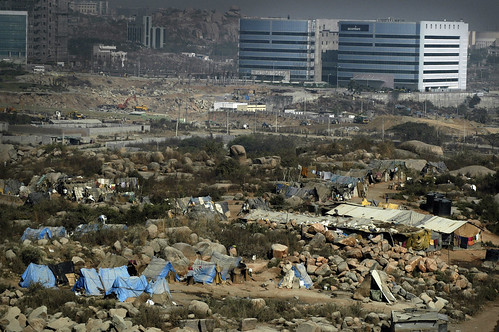Video: 'Llaguno Bridge: Keys to a Massacre' on the 2002 US-backed coup against Hugo Chavez
Llaguno Bridge: Keys to a Massacre (Complete Movie) from Estreito Meio Productions on Vimeo.
April 11, 2012 -- NACLA -- 10 years ago, on April 11, 2002, a group of rebelling military officers, together with opposition leaders and the mainstream media, staged a coup d’état against Venezuelan president Hugo Chávez. Nineteen protesters were killed in the confusing events of that day. Chávez was jailed. Pedro Carmona, the head of Venezuela’s elite business federation FEDECAMERAS, was sworn in as de facto president, quickly abolishing the country’s 1999 constitution, disbanding the congress and installing a virtual media blackout.
Less than two days later, however, pro-Chávez supporters descended from the poor barrios around Caracas and Venezuela. They surrounded the presidential palace, Miraflores, and demanded that their president be returned. Within a few hours Chávez was back in power.
Due to the myths, lies and media manipulation, the truth about the events of April 11, 2002 is still often overlooked.
Venezuela: 10 years after the failed US-backed coup, the revolution continues

April 12, 2012 -- Links International Journal of Socialist Renewal -- The April 2012 broadsheet of the Australia-Venezuela Solidarity Network marks the successful defeat of the US-backed coup aginst Venezuela's President Hugo Chavez.
* * *
On April 13, 2012, Venezuelans and supporters of democracy across the world will celebrate the 10-year anniversary of a popular uprising that defeated a US-backed coup against President Hugo Chavez. The day is an important reminder that any attempts by foreign governments and the internal opposition to remove Chavez from power -- whether through coups or at the October 7, 2012, presidential election -- will be met with the popular mobilisation of the people, on the streets and at the ballot box.
On April 11, 2002, the right-wing opposition, backed by the US and private media, organised a military coup that briefly removed Chavezf rom office. The head of the Chamber of Commerce (Fedecamaras) Pedro Carmona was declared president and a decree was issued dissolving the Supreme Court, the constitution and the National Assembly, and fired the ombudsman and the attorney general.
The dirty picture of neoliberalism: India’s New Economic Policy

Wealth and poverty in India. Photo by DaveWilsonPhotography.
Paul Le Blanc on Barry Sheppard’s memoirs: Revolutionary redemption, lessons for activists

Barry Sheppard in 1964.
By Paul Le Blanc
Britain: The challenge of George Galloway’s ‘Bradford Spring’
George Galloway campaigns in Bradford West.
Promise-breaking at the World Bank: Why Jim Yong Kim will be a heartbreaker

Jim Yong Kim is also known for his rapping and dancing with talented Dartmo
[Click HERE to follow the entire debate on Lenin.]
By Paul Le Blanc
April 5, 2012 -- Weekly Worker, posted at Links International Journal of Socialist Renewal with permission -- I would like to respond to two problematical contentions advanced by Pham Binh in his article ‘Wanting to get Lenin wrong’ (Weekly Worker, March 29, 2012). One of these contentions is about my motivation for disagreeing with his interpretation of Lenin’s thought, and the other has to do with a historical question -- when the Bolsheviks became a separate party. This is part of an extended debate having to do with history and politics (Lenin and the Bolsheviks; tasks facing socialists today). My own contributions touching on these questions can be found at http://links.org.au/taxonomy/term/579.
South Africa: Interview with Soweto socialist councillor

Operation Khanyisa Movement banners at a march in Johannesburg, 2008.
April 5, 2012 -- Links International Journal of Socialist Renewal -- The following interview appears in the South African left magazine Amandla!. The latest issue has just been released. Click here for the full contents. The new issue of Amandla! features analysis of the African National Congress' centenary.
Indonesia explodes into protests over fuel price rise plan

One of the 1063 fuel price protests held in Indone

